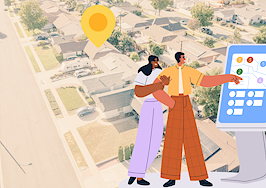This report is available exclusively to subscribers of Inman Intel, a data and research arm of Inman offering deep insights and market intelligence on the business of residential real estate and proptech. Subscribe today.
Technologists have been working on artificial intelligence for decades, but in the last year-and-a-half, something new clicked.

Cat Allday
“I think what’s really happened in the last 18 months is the innovations from OpenAI and these large language models have been trained on billions and billions of data points,” Cat Allday recently told Intel.
Allday serves as vice president of AI and product operations at AppFolio, a company that offers high-tech property management software. She’s been with the company for more than eight years and explained that the concepts behind AI aren’t new.
But what is new is the sudden and remarkable ability of the tech, among other things, to interact naturally with people and help make real-world tasks more efficient. Allday is also optimistic about AI, saying she believes it has the potential to save real estate professionals significant amounts of time.
Critically, Allday also said she doesn’t envision AI eliminating numerous jobs. Instead, it’s about automating certain time-consuming tasks.
“So I think it’s really about activity-elimination more than role-elimination,” she said.
What follows is a version of Allday’s recent conversation with Intel that has been edited for length and clarity.
Intel: First off, give me a rundown of what you’re doing and what your specific role is focused on right now.
Cat Allday: We’ve been in the AI space for a few years now. It started with an acquisition of a product called Lisa, which is our digital leasing assistant, back in late 2018, early 2019. I moved over from another part of the business in January of 2020 to lead up our AI initiative. And really what we wanted to do at that time was make a concerted investment in thinking about how we could deploy these technologies to solve our customers’ problems.
We learned a lot through that acquisition about what the technology was capable of. Over the last few years, we’ve released several more products that are powered by AI. And when I say powered by AI that really means it uses machine learning.
I think a lot of people classify AI with all kinds of, you know, they think of it as automation or an algorithm or just using data science. We specifically say that if a product is powered by AI, it’s using some form of machine learning, whether that’s traditional machine learning or deep learning or [large language models].
For those of us in the peanut gallery who are not tech experts, what exactly is machine learning?
When you think about machine learning, it’s when a program is able to learn from data that it’s ingesting. So you think about traditional software development, a programmer is telling the computer exactly what to do. And with machine learning, what you do is give it some data and some parameters and it starts to learn. It starts recognizing patterns, and that really is the power of machine learning over traditional software development.
How new is this? I know it has received a lot of attention because of things like ChatGPT and DALL-E. But in terms of the definition you’re giving me for AI, is that also new? Has that been around for a long time?
People have been working on artificial intelligence for 50, 60 years. But over the last 20 years, there’s been a lot of development in the space. I think where we’ve seen it probably was in robotics and, you know, autonomous cars and some of those things. And then I think from a software standpoint where you really see it is in the recommendation engines. The big tech companies have been deploying this technology for many years: Google and Apple and others.
I think what’s really happened in the last 18 months is the innovations from OpenAI and these large language models have been trained on billions and billions of of data points.
In traditional machine learning, you might have a model that’s trained on 100,000 data points. So it’s significantly different in the information that it’s able to process. I think the reason why the media has covered it so much is because more people now have access to this technology than ever before. So OpenAI made ChatGPT available to the general end user. And people can see the power of that and experience it for themselves.
To be honest, the speed of innovation has been pretty astounding. To be able to see this technology advance as fast as it has is actually pretty spectacular.
And now what other technology companies are doing is they’re plugging into those models.
You mentioned plugging in. I’m curious if the future in this particular space involves companies building their own tools from scratch or if it’s more about taking what’s out there and adding to it.
I think it’s going to be a combination of those things. OpenAI has these APIs that you can use, so you’re plugging into the training models that they have. And you know, I think people will use those APIs and then build applications on top of them.
I don’t know that people will just take the ChatGPT user experience and replicate that. I think smart companies will think about the user experience, how they’re trying to help their particular users, and then they’re powering it on the back end with, you know, some of these open-source models.
I’m curious about the user experience. Right now if I want to use ChatGPT, I go to the website and interact directly with the tool. Is that the way it’s going to work in the future? Or will it be more like computer code, where it powers the backend?
I think it’s going to be more of the latter.
If you think about some of our products, those have a user interaction component. So a prospect is interested in a unit or an apartment and they want to ask questions about the apartment. They can engage with the AI via text messaging. So there is an interaction with an end user and the technology.
They’ll type in something like, ‘my kitchen sink is leaking.’ And then the AI will kind of prompt them and say, ‘is it the faucet or is it under the sink?’ And it starts to kind of help them fill out the maintenance requests so that the property manager gets a better-reported issue and they can triage that issue or send the right person to fix it.
So they’re interacting with the AI in a different way in that situation where they don’t really know it’s AI. They’re just being kind of prompted through the software. So that’s an example of how end users might use it differently.
I think the other thing is around bubbling up insights or recommendations. So the AI is able to say, ‘hey, did you know this is going on with this particular property?’ I think that’s where the technology is headed.
One of our co-founders shared this with me. He said, ‘I think of AI in the sense of a loaf of raisin bread. You’ve got this loaf of bread and it’s mostly bread, but there are raisins kind of sprinkled throughout the loaf.’ And that’s really how we’re thinking about developing our AI products. It’s traditional software development with a sprinkling of AI.
You mentioned the example of the leaky sink and it got me wondering about jobs and job replacement. Do you see AI replacing humans’ jobs?
I think that there will be some activities that will be eliminated. In that use case, before you may have had somebody answering a phone and asking those questions directly and making sure they got the information. But if you can get the resident to give you the information aided by AI, then when you do send a maintenance tech you know which tech to send. They know which tools to take with them.
So I think it’s really about activity elimination more than role elimination. I think the roles will now be more efficient in the work they do.
Looking forward, how does this technology evolve over the next six months or a year?
A couple of weeks ago we announced AppFolio Realm which is our umbrella where all of our AI products exist. One of the things we announced was a conversational [user interface]. This was a thing where I want to be able to engage with my product using natural language. And there’s so much opportunity there.
Think about trying to find information. Today maybe I have to go run a report and then I have to go find the data in the report. And maybe it’s in Column G, Row 52. But now what I could do using this UI is simply ask what the rent roll is for a particular property for last month. And it can go and just return the value.
That’s really a time saver. The other thing I think it’ll be able to do is actually do things for you.
So let’s say I’m a maintenance person or a grounds person and I’m walking the property and see somebody parked illegally or blocking an exit. I could take out my phone and say, ‘Hey, look up whose license plate number that is.’ And it could come back with who that resident is. And then I could say, ‘Send Joe Smith a message that if he doesn’t move his car within two hours we’re going to have it towed.’ And it sends all that and I don’t have to go to a computer or do anything other than talk to my phone.
That to me is the power of these products. And I think that’s something that’s going to be possible very soon.













